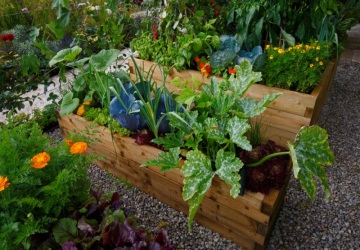Whether you have a big backyard or few window pots in the room, growing your organic food turns into a transformative experience.
Choose easy-grown veggies if you want to grow some vegetables in your garden. When starting, grow food on raised beds and pots to make good soil. This soil grows healthy plants, preventing insects, pests, and diseases. A healthy soil nourishes vigorous plants.
Set planting height to 50 cm on raised beds. Arrange the bed's center to reach the middle without walking on the plant's top. It avoids soil compaction - allowing air and water between the particles. Besides, build the raised beds with wood, bricks, or corrugated tin. Avoid materials like railway sleepers as they leach creosote into the soil.
Gardening is a simple, low-maintenance, and less-effort task. Any expert or experience, even a garden, is optional if you lack space. Thus, here are a few tips to start making your organic food at home.
8 Tips to Grow Organic Food
Grow a flourishing garden in your home space to enjoy good health and save money.
1. Planning Your Organic Garden
You've to choose the plants depending on the available space. Herbs, vegetables, and fruit plants are the best choices.
Before starting to dig the ground:
·Plan your organic garden.
·Choose a sunny spot where plants will receive sunlight for 7 to 8 hours.
·Buy high-quality organic compost to thrive in your garden.

2. Seeds & Seedlings
The foremost step is bowing seeds or seedlings. It's your choice whether to opt for seed or seedling.
Seeds allow you to control and observe the growth of plants. Follow the steps on the seed packet to build a proper foundation, provide fresh air and sunlight, and water the seed consistently.
On the other hand, seedlings save time waiting for the first shoot to burst. Seedlings are available at any local nursery. Ensure to purchase healthy seedlings for successful planting.
3. Organic Soil Management
One of the most critical steps is nurturing soil. Some critical roles for healthy organic gardening must be performed, including composting, mulching, and crop rotation.
Composting
Composting maintains the level of nutrients in the soil, so it's the most important. Blending soil and compost provides a varied diet of organic matter and minerals to the plant. Also, fix a compost bin for kitchen scraps and yard waste. These waste products compose essential nutrients good for the soil.
When growing organic food, artificial fertilizers can't do the job. You must add compost every season without covering the bed. If you grow plants in pots, make drainage holes to replenish the soil with air, water, and nutrients.
Mulching
Mulching is another essential step to maintain the temperature of the soil. Use organic ways such as strawing or applying wood chips to sustain the moisture and control weeds.
Crop Rotation
Crop rotation helps prevent soil erosion. It reduces the risk of nutrient imbalance, pests, and plant diseases.
4. Organic Pest & Disease Management
Protection against pests is the most crucial point to consider. Chemicals can harm or poison your plant; therefore, use different ways to make natural pesticides.
Companion planting is quite a simple method to control pests. Such plants act as pesticides for your fruit or vegetable plant. Handpicking is also one of the ways to make your plant pest-free. Neem Oil works as a natural pest controller that removes many harmful insects.

Some insects might be suitable for your plants; they protect them from feeding on garden pests. Ladybugs, lacewings, and a few more insects prove to be beneficial.
5. Watering Techniques
The basic need of a plant after soiling is watering. Plants need plenty of water; some require less water, while others need frequent watering. But be careful, as exceeding the water level damages your plant. Mulching retains the moisture, lowering the need for regular watering.
Try to install a drip irrigation system to deliver water to the base of plants. Also, set rain barrels to collect rainwater for watering your organic garden. It reduces the usage of municipal water.
6. Harvesting Your Organic Production
When harvesting begins, it's time to get the sweet fruits of your hard work. You should know when to harvest your gardening.
It would help if you had a few essentials for harvesting, like clean, sharp scissors or a cutter. You need to handle it gently and carefully while harvesting to avoid any damage to the plant.
Harvesting Time
Read the information in the seed packets or gardening books about when to harvest your plant. Usually, when the fruits and vegetables display a bright color and are easy to detach from the plant, it's the right time to harvest.
Fresh, healthy, and organic fruit or vegetables harvested from your garden have plenty of unique flavor, taste, and nutrients. Add it to your meals after fresh harvest to enjoy the bounties.
7. Organic Gardening In a Small Space
You can still grow organic food at home if you have limited space. Use the wall space to grow climbing plants like beans, cucumbers, and tomatoes.
If you have an indoor space, try gardening plants. Grow herbs, green vegetables, and small fruits in pots on your balcony or patio.
8. Maintain Sustainability
Besides growing organic food, make your garden sustainable for future replenishment and growth. Collect and store seeds from your garden to use in future seasons. Keep composting and recycling to reduce waste and maintain the garden's nutrient cycle.
Besides this, plan your meals to minimize food waste and preserve the extra through freezing, canning, or drying. Another way for Sustainability is to share your organic-grown food with family, friends, and local food banks. It reduces food shortage and promotes a healthy community.
Conclusion
Growing organic food at home promotes health and Sustainability. You can create a flourishing garden with fresh, nutritious productions for your kin and kin. Also, reducing the environmental impact.
Eating your grown food has another level of excitement since the taste and freshness is unmatched. So, make your organic food and enjoy the unique flavors.